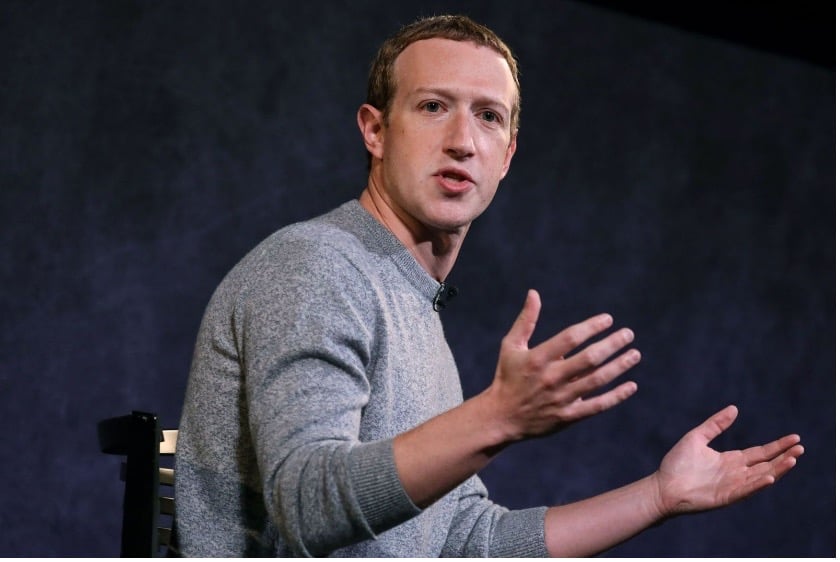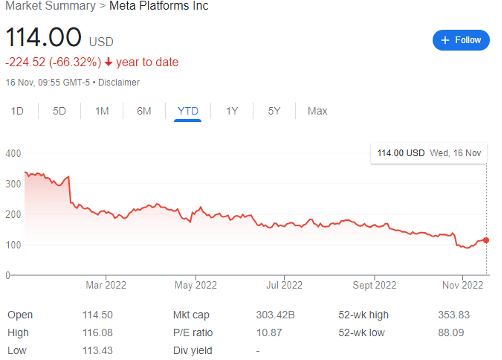Meta shares are rising as CEO Mark Zuckerberg pivots investment away from the Metaverse. A TikTok ban could catalyse the rocket.

Three things are holding back Meta Platforms’ (NASDAQ: META) share price. The first was changes to Apple’s privacy terms, which is costing the social media platform circa $10 billion per year.
The second is CEO Mark Zuckerberg’s $1 billion a month unhealthy obsession with the Metaverse. And the third is TikTok, which with over 1 billion users, has been stealing eyeballs and market share from the former king of social media.
Meta shares: Metaverse redirection
But Meta’s ‘family of apps’ — Facebook, WhatsApp and Instagram — still boast 2.93 billion daily active users. For context, 4.9 billion people have internet access worldwide, meaning that roughly 60% of the world uses a Meta app every single day.

But despite Meta shares having risen by 30% since the start of the month to $114, they remain 65% down year-to-date. This correction may be an overcorrection.
Zuckerberg recently admitted that his Metaverse direction has been too full-on, saying ‘I got this wrong, and I take responsibility for that.’ Unlike its competitors, Meta had been expanding its workforce through 2022. But it’s now tanking a 13% haircut, or 11,000 employees, in what the CEO described as ‘some of the most difficult changes we’ve made in Meta’s history.’
While this redirection may be dragging the share price higher for now, there are two more things to consider. With the Metaverse plan firmly on the backburner, Apple may once again derestrict Meta advertising on iOS platforms. This could become more likely depending on the rumours that Apple is building its own Metaverse.
But more importantly, ByteDance-owned TikTok could soon see a total ban across the US and the wider west.
TikTok ban analysis
The US could be the first to ban the Chinese-owned social media app. With relations already souring over SEC regulatory demands, the Ukraine War, and Taiwan, FBI Director Chris Wray has told Washington lawmakers that there exists ‘the possibility that the Chinese government could use [(TikTok) to control data collection on millions of users or control the recommendation algorithm, which could be used for influence operations.’
Further, he believes that Beijing could ‘control software on millions of devices,’ giving it the opportunity to ‘technically compromise’ them.
The US government’s Committee on Foreign Investment in the United States (CFIUS), which reviews U.S. acquisitions by foreign acquirers for potential national security risks, has been in talks with TikTok for months aiming to agree a national security agreement. But subjectively, it feels like too many politicians want it gone.
Indeed, former President Trump attempted to block new users from downloading the app in 2020, an effective ban, but lost several court measures over the plan. With a new Presidential bid, this plan could make a comeback.
Federal Communications Commission (FCC) Commissioner Brenden Carr has also spoken out in favour of a ban. Citing national security concerns, the Republican argues that 26% of Americans under 30 now get their news from the app, and that China’s government could therefore choose to influence the US political agenda through mass data gathering and propaganda.
Republicans Marco Rubio and Mike Gallagher recently co-wrote an op-ed in favour of a ban. And Trump’s former Secretary of State, Mike Pompeo, has likened the app to a ‘Trojan horse for the Chinese Communist Party.’
But the Biden administration, perhaps mindful of the app’s popularity and political usefulness among its younger voter base, is in favour of a draft agreement which would force TikTok to exclusively use US-only storage for all TikTok data, monitor the app’s content recommendation algorithms, and create an oversight board comprised of objective cyber-security experts. Currently, the terms of the draft agreement would not require ByteDance to sell TikTok.

Of course, this still means that the app and all its data would remain under the ownership of a Chinese company which, according to strict Chinese law, is required to provide this data to the Communist government upon request, without notice.
In June, Buzzfeed reported that China-based employees of ByteDance had accessed non-public data about US-based users. TikTok has denied turning over this US data to Chinese officials, saying it never would, despite its legal obligations and the acknowledgement that some Chinese employees already have a modicum of limited access.
Even if the Democrat plan goes ahead, the Department of Justice has already warned that TikTok users would still be at risk of having their personal data hacked or spied upon by China.
And if a total TikTok ban does come, Meta shares will almost certainly rocket to new heights.
This article has been prepared for information purposes only by Charles Archer. It does not constitute advice, and no party accepts any liability for either accuracy or for investing decisions made using the information provided.
Further, it is not intended for distribution to, or use by, any person in any country or jurisdiction where such distribution or use would be contrary to local law or regulation.

Leave a comment